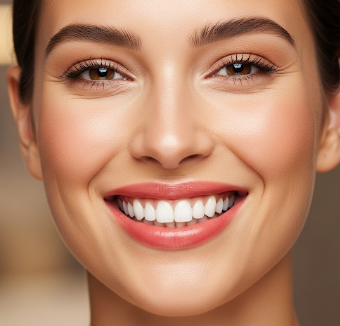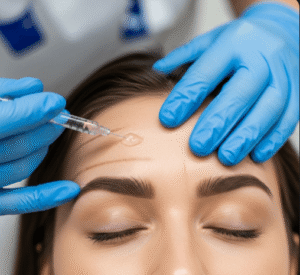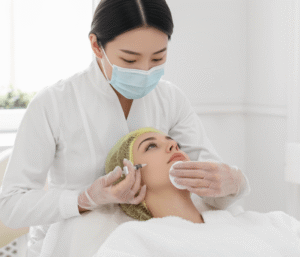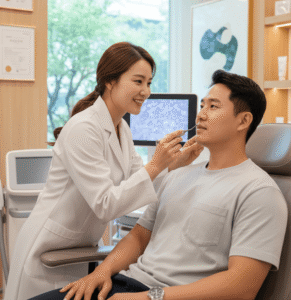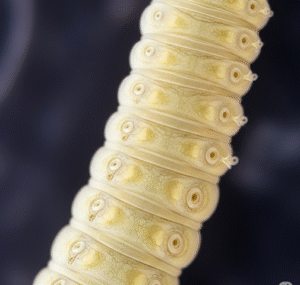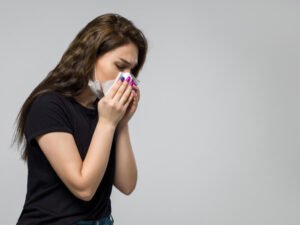What it is
Teeth whitening is a cosmetic dental procedure designed to lighten the color of teeth and remove stains or discoloration.
➡ Key facts:
- ✔ Uses bleaching agents such as hydrogen peroxide or carbamide peroxide
- ✔ Can be performed in-office by dentists or through at-home kits prescribed by dental professionals
- ✔ Types of discoloration treated:
- Extrinsic stains → From coffee, tea, smoking, or food
- Intrinsic stains → Caused by aging, trauma, or certain medications
- ✔ In Korea, teeth whitening is widely available in dental clinics, cosmetic dentistry centers, and specialized aesthetic dentistry clinics
💡 Teeth whitening enhances smile aesthetics and boosts self-confidence, but it is primarily cosmetic and not a treatment for dental disease.
Why it’s done
People choose teeth whitening for:
➤ Cosmetic improvement → Brighter, whiter smile
➤ Boosting self-confidence → Enhances personal and professional appearance
➤ Removing stains → Coffee, tea, red wine, smoking, or certain foods
➤ Special occasions → Weddings, photoshoots, or professional events
➤ Maintenance → Lightening naturally yellowed teeth over time
⚠ Teeth whitening is not suitable for individuals with untreated cavities, gum disease, or certain dental restorations.
Alternatives / Complementary Measures
Other options to improve tooth appearance include:
✔ Dental veneers → Thin porcelain or composite shells covering the front of teeth
✔ Dental bonding → Composite material applied to correct discoloration or minor defects
✔ Professional cleaning (scaling & polishing) → Removes surface stains and plaque
✔ At-home whitening toothpaste or strips → Mild whitening effect for maintenance
⚠ Professional whitening is more effective and longer-lasting than over-the-counter options.
Preparation
Before teeth whitening in Korea:
🔹 Dental examination → Identify cavities, gum disease, or enamel erosion
🔹 Professional cleaning → Remove plaque and tartar for even whitening results
🔹 Discuss expectations → Dentists explain achievable shade and procedure limitations
🔹 Allergy check → Rarely, some patients may be sensitive to bleaching agents
💡 Korean dental clinics provide pre-treatment consultations and shade analysis to ensure safe and effective results.
How it’s done
➡ In-office teeth whitening (most common in Korea):
- Protection → Gums and lips shielded with gel or rubber barrier
- Application → Bleaching agent (hydrogen peroxide or carbamide peroxide) applied to teeth
- Activation → Light or laser may be used to enhance whitening effect
- Multiple sessions → 30–60 minutes per session; some cases require repeat treatment
➡ At-home whitening kits (supervised by dentist):
- Custom trays filled with whitening gel
- Worn for several hours or overnight over 1–2 weeks
- Dentist monitors progress to ensure safety
💡 Professional in-office treatments deliver faster, more dramatic results than at-home kits.
Effectiveness & Success Rate
✔ High success for extrinsic stains → Teeth often whiten 2–8 shades
✔ Intrinsic stains → May require repeated or combined treatments (veneers or bonding)
✔ Long-lasting results → Depends on oral hygiene and lifestyle habits
✔ Maintenance → Regular dental check-ups, limited staining foods, and touch-up treatments
💡 Korea is known for advanced cosmetic dentistry technology, ensuring effective and predictable whitening results.
Recovery / Expected Outcomes
✔ Immediate outcome → Brighter, whiter teeth visible right after in-office sessions
✔ Mild sensitivity → Teeth may be sensitive to hot or cold for 24–48 hours
✔ Normal activities → Resume eating, drinking, and oral hygiene immediately
✔ Follow-up → Dental check after 1–2 weeks to assess shade and recommend maintenance
💡 Most patients experience satisfying aesthetic results with minimal disruption.
Complications / Risks
⚠ Teeth whitening is generally safe but may cause:
➡ Short-term effects:
- Tooth sensitivity
- Gum irritation if bleaching gel contacts soft tissue
➡ Long-term considerations:
- Overuse can weaken enamel
- Existing dental restorations do not whiten (veneers, crowns)
💡 Korean dentists provide post-treatment instructions, including avoiding staining foods and proper oral care.
Treatment Options in Korea (Post-Whitening Care)
🔹 Desensitizing toothpaste → Reduces temporary tooth sensitivity
🔹 Avoid staining foods/drinks → Coffee, tea, red wine, and strongly colored sauces
🔹 Touch-up treatments → Periodic professional or at-home maintenance
🔹 Regular dental check-ups → Ensure oral health and long-lasting results
🔹 Cosmetic consultation → Address aesthetic goals and complementary procedures
💡 Korean clinics emphasize holistic cosmetic care and combine whitening with cleaning, veneers, or orthodontics if needed.
Top Hospitals & Clinics in Korea for Teeth Whitening
🏥 Seoul National University Dental Hospital (SNUDH) – Advanced cosmetic dentistry
🏥 Asan Medical Center Dental Clinic (Seoul) – Professional in-office whitening
🏥 Samsung Medical Center Dental Clinic – Laser and light-assisted whitening techniques
🏥 Specialty cosmetic dentistry clinics – Nationwide, with custom tray systems and aesthetic planning
🏥 Private dental chains – Accessible and efficient services for teenagers and adults
Conclusion
Teeth whitening in Korea is a safe, effective, and popular cosmetic dental procedure that enhances appearance and boosts confidence.
✔ Professionally supervised treatments deliver predictable, long-lasting results
✔ Quick in-office sessions and at-home kits provide flexible options
✔ Minimal side effects, mainly temporary sensitivity
✔ Comprehensive post-care ensures optimal aesthetics and oral health
By offering advanced whitening technologies, professional oversight, and aesthetic consultations, Korea ensures patients achieve a bright, healthy, and confident smile.

